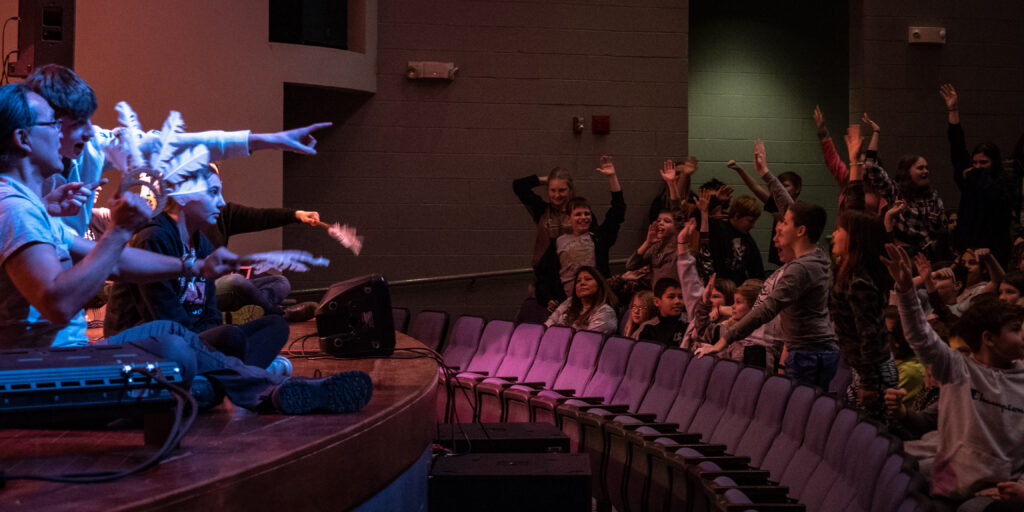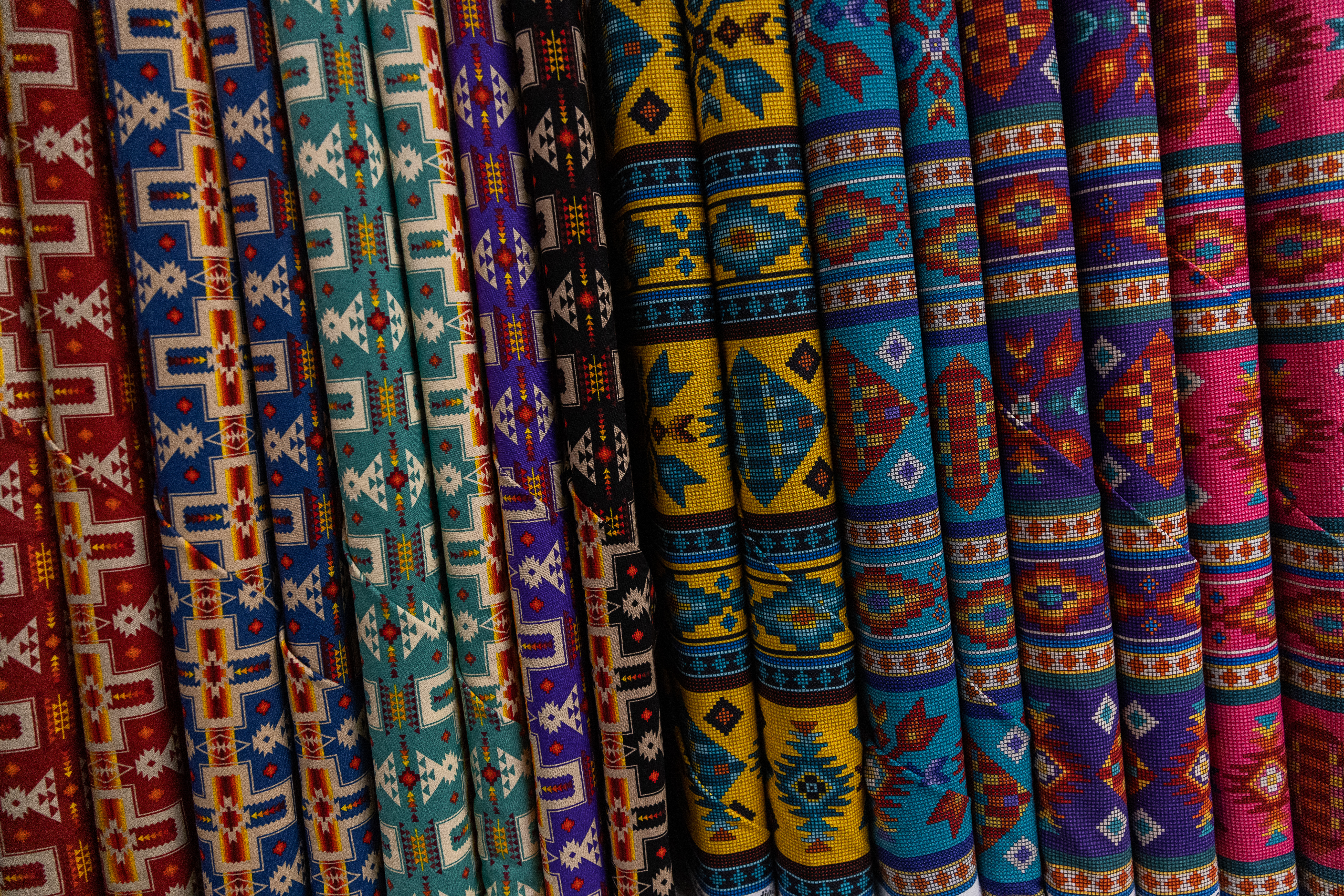In December 2022, Arts Midwest unveiled a Living Commitment to Native Nations along with an action plan for the year to come. This statement and plan is the culmination of a year-long collaborative effort by a dedicated team of staffers at Arts Midwest.
Arts Midwest understands this work requires a constant state of learning and growth. It is a journey we are on both collectively and individually across the organization. We expect our shared education and efforts will be reflected in multiple revisions of this commitment and action plan over time, as well as other direct actions that continue to uplift Native and Indigenous people.
We commit to revisiting our action plan in fall of 2023 and sending our community updates on this plan in January 2024.
Living Commitment To Native Nations
Native Nations and Indigenous people are still here and will be here beyond the boundaries of time and politics. Native people, Native land, Native history, and Native futures are essential and intrinsic to the region that is now called the Midwest.
Leaders of Native communities across this region negotiated in good faith, and government to government, through treaties. In doing so, these treaties reserved sovereignty, inherent fishing and gathering rights, and self-determination. When land wasn’t ceded through good faith efforts, it was relentlessly stolen from Indigenous communities. Treaties are the laws of the land; lands across the United States were ceded through treaty processes that have been broken over and over.
Through the Urban Relocation Program in the 1950s, major Midwestern cities such as Minneapolis and Chicago were central to assimilation efforts by the U.S. government in efforts to further reduce reservation lands. These urban centers have become central to arts, justice, and social movements for Indigenous people and allies.
Today, there are 42 federally-recognized Native Nations that share the geography of the nine-state region served by Arts Midwest. Our main office is located on the shores of Bde Maka Ska, a site that has been central to the Očhéti Šakówiŋ (People of the Seven Council Fires, or Dakhóta/Lakȟóta/Nakhóta) for generations; our staff are located across the Midwest region.
Arts Midwest believes creativity has the power to inspire and unite humanity. Arts Midwest amplifies creativity by supporting, informing, and celebrating arts organizations and creative communities. The arts can connect people through space and time and across cultural boundaries, build understanding between peoples, and give rise to healing opportunities.
At Arts Midwest, we believe that statements are only the first part of an engaged process towards building relations with Native communities. As our organization develops, we have more work to do to uplift Native communities and artists. We need to recognize and stand in solidarity with the active histories and The People who call and have called the Midwest home for countless generations. We invite you to join us in acknowledging all of this, as well as our collective responsibility towards decolonization and solidarity with Native Nations and Indigenous communities.
Our Current Actions (As of December 2022):
We have opportunities for Native Nations and Native-led organizations to receive funding
- All our grants are open to federally recognized tribes or 501c3s led by Native and Indigenous people.
- As part of our Grow, Invest, Gather (GIG) Fund grant, we partner with Western Arts Alliance on their Advancing Indigenous Performance Program, which promotes the touring and engagement of Indigenous performing artists. During the GIG Fund grant selection process, we prioritize awards that feature Native artists and/or support Native-led organizations.
We prioritize growing relationships with Native-led organizations and communities
- We prioritize working with Native-owned businesses as part of our vendor policy.
- We direct funding and other support to Native-led organizations through programs including the Community Creativity Cohort.
We seek to engage Native artists in our current and future programming
- We feature books by Native authors as part of the NEA Big Read. Book selections available for programming in the 2022-2023 and 2023-2024 cycles include:
- There, There by Tommy Orange, a citizen of the Cheyenne and Arapaho Tribes of Oklahoma
- Postcolonial Love Poem by Natalie Diaz, enrolled member of the Gila River Indian community
- In the 2022-2023 cycle of World Fest, we are working with Pamuya, a Yup’ik musical group from Anchorage in Alaska.
- Pamuya will tour through the Midwest for week-long educational residencies. They created a four-part video series featuring Yup’ik food, games, masks, and music commissioned by Arts Midwest.
We partner with Native-led organizations on educational materials and trainings
- We worked with the Native Governance Center on an Ideas Hub piece about Going Beyond Land Acknowledgments, designed “to help arts organizations go beyond a statement and develop an action plan that actually supports Indigenous people.”
- Dr. Craig Howe, founder and director of the Center for American Indian Research and Native Studies (CAIRNS), citizen of the Oglala Sioux Tribe, and current Arts Midwest board member, led presentations and discussions with the Arts Midwest board and staff in 2022.
Our Future Actions
Six Months to Two Years
- We will complete an analysis of our current and historical grantmaking to see gaps in our support and understand the impact our grants/programs have had in Native communities by the end of 2023.
- We will develop additional public resources for the Ideas Hub in partnership with a Native-led organization by the end of 2023.
- We will commission stories covering Native communities, created in partnership with Native creatives. These stories will comprise at minimum 20% of Arts Midwest’s commissioned stories in 2023 (10-12 stories) and 30% in 2024 (18-21 stories).
- We will center on Native creatives in Season 2 of the Filling the Well podcast, launching in spring 2023. Season 2 will be co-hosted by Leah Lemm, member of the Mille Lacs Band of Ojibwe.
- We will include more Native artists and/or community leaders on our grant review panels, with a goal of having 10% of overall panel participants identify as Native by the end of 2024.
- We will build relationships with and learn more about tribal communities in the Midwest region by prioritizing Native-led organizations in our program partnerships and being present (as appropriate) at Native-led community events across our region.
- We will increase awareness of available arts funding and support applications from Native Nations by conducting targeted outreach to Native organizations in our region.
Two to Five Years
- We will pivot our overall support portfolio so that at minimum 10% of our funding and programs will benefit Native organizations and/or artists by 2026.
- We will seek new funding streams that would give us the ability to fund individuals and/or support the ways that Native orgs are currently operating beyond 501c3s and federally-recognized tribes.
- We will develop an arts-based grant or program in partnership with Native nations/organizations in our region.
-
February 19, 2024
Arts Midwest’s Living Commitment to Native Nations: 2023 Update
By Arts Midwest
An update on the actions we made to activate our living commitment to Native Nations last year, and what’s still in progress.

